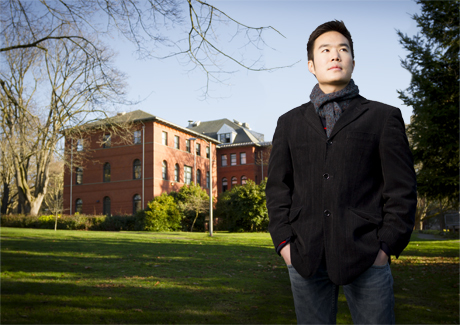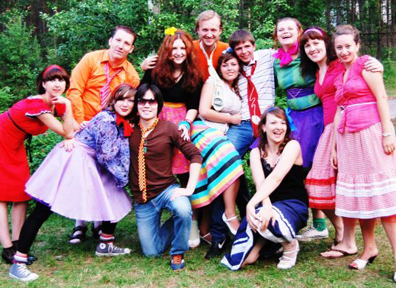Julian Chan has come full circle. Seven years after graduating with bachelor’s degrees in Russian and computer science, the UW alum is back on campus, working toward a master’s degree that combines his two passions, language and technology.
“The program fits my interests perfectly,” says Chan of computational linguistics, a Master of Science program in the Department of Linguistics that focuses on the human-language aspects of computing.

Chan has always been intrigued by language. Growing up in Macau on China’s southeastern coast, and then boarding school in Canada, Chan was particularly interested in “everything Russian.” He chose the UW for its reputation in computer science but enrolled in a Russian course for fun. “I really liked the class,” Chan recalls of Russian 101, offered by the Department of Slavic Languages and Literatures. “It’s a pretty complicated language, and I enjoy a challenge.” More Russian language courses followed, as well as courses in Russian history and literature and a quarter-long study abroad program in St. Petersburg.
After graduating in 2007, Chan wanted to explore the world. He earned a TESOL (Teachers of English to Speakers of Other Languages) degree and—after globetrotting in Nepal and Tibet—arrived in Russia on a tourist visa, hoping to find work at an English language school. “In the long-term, I always intended to work as a programmer, but I felt I could do that later,” explains Chan. “First I wanted to live abroad, while I was still young with no responsibilities.”
After calling a few language schools with no success, Chan happened upon a building with an “English School” sign out front and decided to apply on the spot. He interviewed the same day. “One of the first questions they asked was ‘How do you feel about teaching kids?’” recalls Chan, who was quickly hired as a teacher for the school’s summer camp, held outside the city. He later became a full-time language teacher at the school, working with both children and adults.
Language can be very ambiguous and a lot of work goes into programming computers to handle the ambiguity. When it works, it feels like magic.
When Chan wasn’t teaching English, he spent his time in St. Petersburg working on a prototype for a mobile app—an interactive map of the subway systems in major Russian cities. “There were existing apps, but they weren’t very good,” explains Chan. A Russian friend, learning that Chan was a programmer, put him in touch with her roommate, a freelance graphic designer. “He was talented,” says Chan of the designer, “so we started working on the project together.”
Collaborating on a mobile app with a non-programmer, particularly when everything had to be explained in Russian, had its challenges. But Chan and his partner persevered and completed the app, which found success in the marketplace. Competitors eventually caught up—a common circumstance in the rapidly evolving tech world—but the project inspired Chan to return to the U.S. to pursue programming full-time.
Chan landed a job at Microsoft as a software development engineer, thanks in large part to having published his own app. At Microsoft, he worked on messaging apps for the Microsoft Windows phone—a huge departure from his previous job teaching English in Russia.

“The stakes were very different,” says Chan. “I was invested in having my Russian students learn English, but it’s hard to compare working with ten students versus writing software that will be used by millions of people.” The Microsoft job also bore little resemblance to Chan’s previous programming projects. “In college, when you write code, it only has to work once,” explains Chan. “But writing production-quality code that works all the time is very different. It’s a real challenge. You need to be conservative and follow best-practices.”
After three and a half years at Microsoft, Chan itched to move beyond his role as a “Jack-of-all-trades” programmer doing generic software engineering. It was time, he decided, to combine his passions for language and programming. And the UW’s computational linguistics program was just the place to bring those two interests together, with its focus on using computers to process human language.
Chan explains that the field of computational linguistics has grown as programs like the iPhone’s Siri and applications like Google Translate have become increasingly important. “It’s not trivial to train a computer to understand human language,” says Chan. “Language can be very ambiguous and a lot of work goes into programming computers to handle the ambiguity. When it works, it feels like magic.”
Chan looks forward to returning to the technology industry after earning his master’s degree. But right now he’s savoring his graduate studies, which have introduced him to peers and professors who are simpatico in so many ways.
“I feel like people in the computational linguistics program are of a similar mind and share similar passions,” says Chan. “Language tickles my brain in a way that’s hard to explain. Most people who love language would say that. The people in this program understand that better than most.”
More Stories

Finding Love at the UW
They met and fell in love as UW students. Here, 10 alumni couples share how they met, their favorite spots on campus, and what the UW still means to them.

AI in the Classroom? For Faculty, It's Complicated
Three College of Arts & Sciences professors discuss the impact of AI on their teaching and on student learning. The consensus? It’s complicated.

What Students Really Think about AI
Arts & Sciences weigh in on their own use of AI and what they see as the benefits and drawbacks of AI use in undergraduate education more broadly.